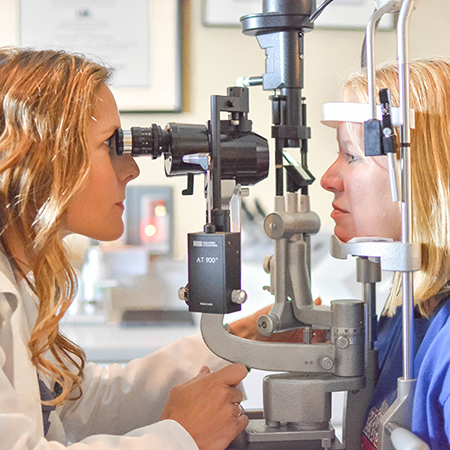
Macular Degeneration

Age-related macular degeneration is when a part of your retina, called the macula, is damaged, which causes the loss of central vision. Those afflicted cannot see fine details either close or far away, but your peripheral vision is still normal. For example, if you're looking at a clock with AMD, you'd be able to see the numbers around the clock, but not the clock hands.
Types of AMD
There are two types of age-related macular degeneration:
- Dry AMD is the most common form with about 80% of all patients with AMD afflicted with dry AMD. Dry AMD occurs when the macula gets thinner with age and tiny clumps of protein called drusen grow on the macula.
- Wet AMD is much more serious than dry AMD and occurs when new, abnormal blood vessels grow under the retina. When these vessels leak blood or other fluids, it causes scarring of the macula. Vision is lost at a faster rate with wet AMD.
Risk Factors
You may be at risk for AMD if:
- Your diet is high in saturated fat
- You are overweight
- You smoke
- You are over 50 years old
- You have a family history of AMD
Treatment
Currently, there is no treatment for the dry form of AMD, but certain supplements have been shown to slow the effects of the condition. Anti-VEGF treatment, which is a treatment that involves the injection of medication into the eye, as well as laser surgery can be used to reduce the number and blood vessels in the retina and slow any blood vessel leakage for those suffering with wet AMD.
For more information, please contact our office and schedule and appointment today to discuss your eye health and an individualized treatment plan with our doctors.
- Strabismus
- Refractive Errors
- Ptosis
- Ocular Emergencies
- Nearsightedness
- Macular Degeneration
- Learning Disabilities
- Glaucoma
- Dry Eye
- Digital Eye Strain
- Diabetic Eye Disease
- Corneal Abrasion
- Cataracts
- Blocked Tear Duct
- Amblyopia
- Eye Conditions Overview
Directory
Conditions
Eye Conditions
At Lafayette Family Eye Care, we treat an array of eye conditions to ensure optimal eye health. Find out more information about these commonly diagnosed conditions, including the symptoms, types, and treatments, by clicking below!
Learn More